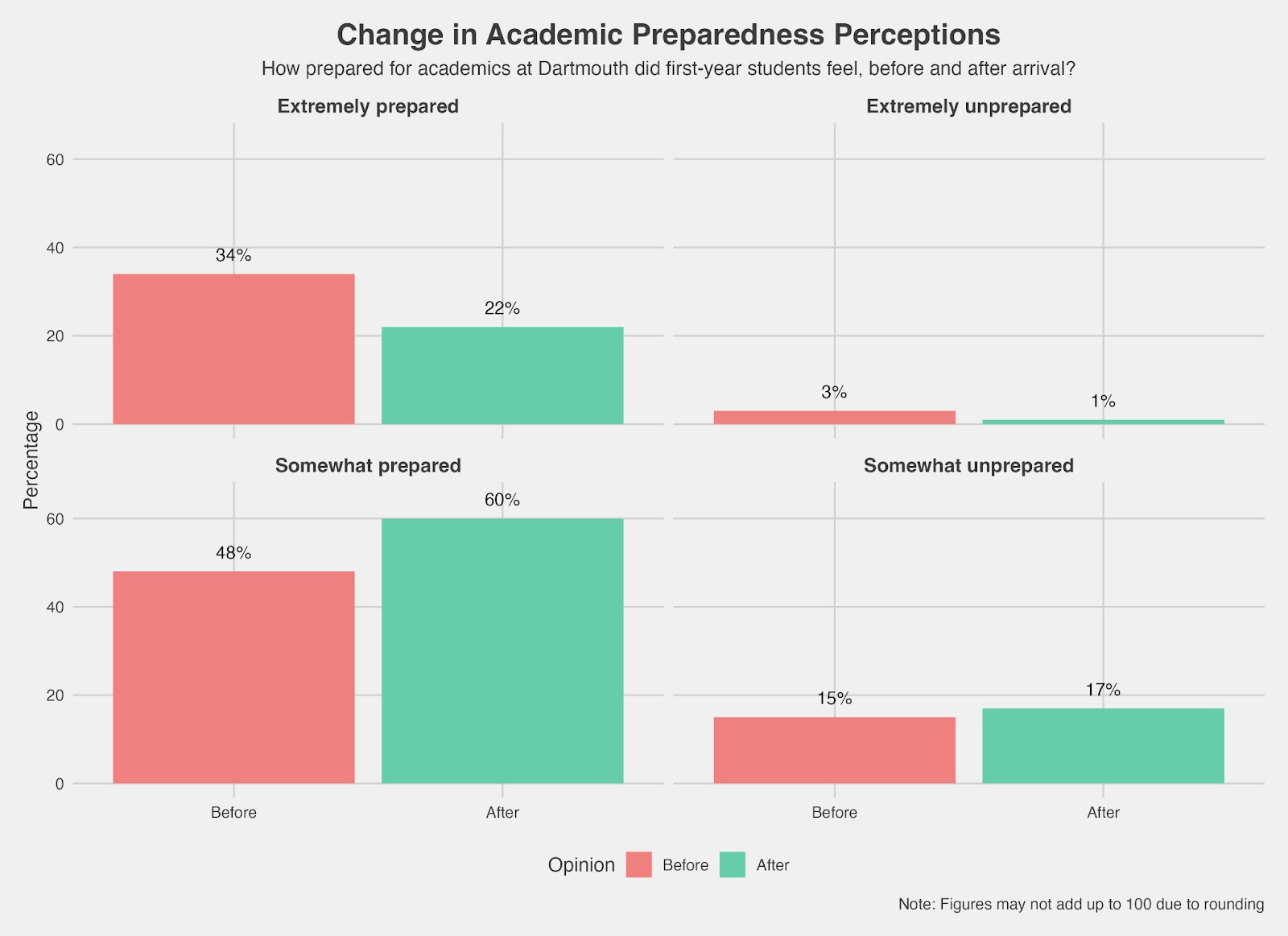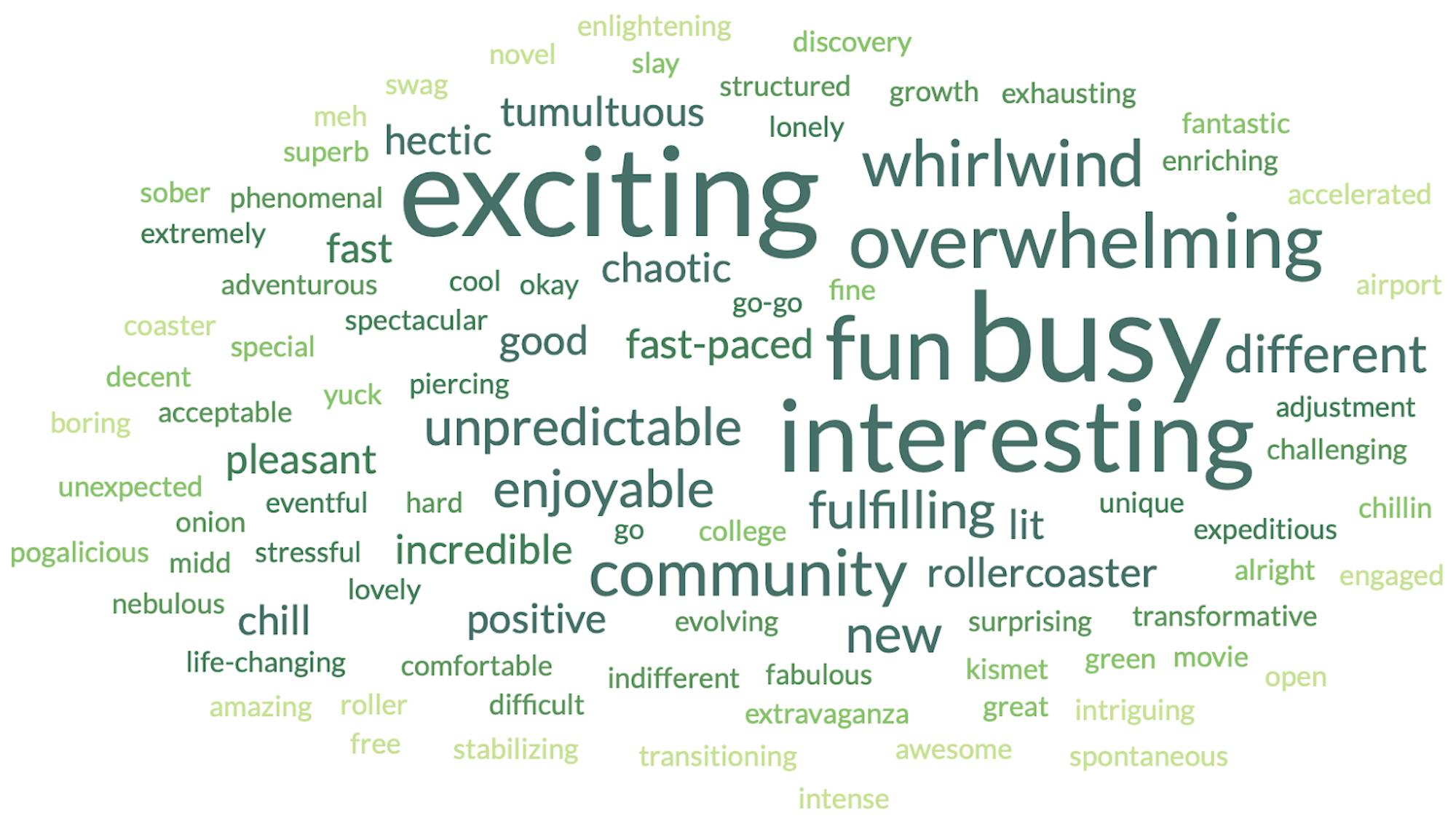For the first time, The Dartmouth conducted a survey of first-year students to complement the annual senior survey of the graduating class. Students were asked to compare their high school and college experiences, as well share their views on Dartmouth’s academics, social scene and campus issues. The following four sections provide a breakdown of their answers.
Dartmouth in a Word
The Dartmouth asked members of the Class of 2027 to describe their Dartmouth experience so far in one word — and the answers portray a fast-paced term filled with challenging yet enriching new experiences. The terms “exciting” and “busy” appeared the most frequently, followed by “interesting,” “fun,” “overwhelming,” “whirlwind,” “fast” and “community,” respectively. As fall term draws to a close, members of the Class of 2027 reflected fondly upon their first term at Dartmouth.
Comparing High School and College
As the Class of 2027 adjusted to life on campus this term, students have experienced shifts in sleep schedules, social media time and substance use.
First-years report getting less sleep at Dartmouth than in high school. When students were asked how many hours of sleep they got on weeknights in high school versus college, the most commonly reported range for high school was 7-8 hours at 38%, while the most commonly reported range for Dartmouth was 6-7 hours at 39%.
First-year students have also spent less time on social media since coming to college. 58% of the Class of 2027 reported a decreased use of social media, while 26% experienced no change, and 16% increased their time.
In addition, the Class of 2027 has consumed more alcohol, drugs and other substances since arriving on campus: 36% of respondents reported increased substance use, while 33% experienced no change. Although there was an increase in substance use, most students who engaged in these activities had done so prior to Dartmouth — only 15% of students drank alcohol for the first time at Dartmouth. Meanwhile, 60% of first-years reported drinking before Dartmouth, and 24% never drank alcohol at all. 60% have also never used drugs or substances, and 11% did so for the first time at Dartmouth.
Campus Issues

The Class of 2027 holds mostly optimistic views of the College. Professors and faculty, the Dartmouth Outing Club and President Sian Leah Beilock were the most favorable Dartmouth organizations and figures among first-years. However, the survey was sent to first-year students prior to the arrests of two students on Oct. 28, with little responses recorded after the arrests — which may have since impacted these levels of optimism. In addition, not all responses were as unified. For example, viewpoints were split on Fizz — an anonymous social media app used by students — which was perceived favorably by 45% and unfavorably by 27%. Dartmouth’s Greek System was likewise split at 38% favorable and 31% unfavorable, as well as the Department of Safety and Security at 43% favorable and 34% unfavorable.
In comparison to last year’s senior survey of the Class of 2023, the Class of 2027 holds notably different views. 60% of the graduated class held an unfavorable or somewhat unfavorable view of the housing communities, while the first-years hold a 71% favorability rate. The graduated class also held negative views of the administration at 72%, which is in opposition to the first-year class at 14% unfavorability. Generally, last year’s seniors seem to harbor much more disfavorable views than the new class — except with a notable similar favorability rate of professors and faculty at 96% and 95% for the Class of 2023 and 2027, respectively.
Although 63% viewed Dartmouth Dining as favorable and 29% as unfavorable, there was greater unity in the class’s favorite dining location. The Class of 1953 Commons, where first-year students on the Ivy Unlimited plan are able to continuously use their meal swipes, was the preferred dining location for 68% of the class. Other favorite locations include Collis Cafe, Novack Cafe and Courtyard Cafe at 14%, 9% and 8% respectively. The least popular locations were The Fern, Ramekin Cafe and Cafe@Baker, where meal swipe equivalencies are not accepted.
First-years also shared their favorite study spots on campus, with 42% of respondents preferring one of the Berry floors. The Berry Floors were followed by the Baker Stacks at 10%, the Tower Room at 9%, Sanborn Library at 7%, the Engineering and Computer Science Center and Irving Institute for Energy and Society at 6% and the East Reading Room at 5%. Alternative responses were offered by 15% of the class, including the Sherman Art Library, Fairchild Physical Sciences Center, Kemeny Hall and dorm rooms.
Outside of cozy study spaces, when asked about their feelings on the Hanover weather so far, 48% of first-years felt positively, 17% felt negatively and 35% were neutral.
Student Life

Before matriculation, First-Year Trips welcomes each incoming class by introducing them to the great outdoors around Hanover. Participation in this decades-old Dartmouth tradition was high: 94% of respondents participated in First-Year Trips. Out of the Trips participants — known as “trippees” — 94% of students were extremely or somewhat satisfied with their Trips experience. The impact of First-Year Trips is ongoing, as 66% of students reported still talking to both their fellow trippees and Trip Leaders, while 19% talk only to their trippees, 12% do not talk to either their trippees or Trip Leaders and 3% talk only to their Trip Leaders.
Outside of the classroom, the Class of 2027 is busy with a number of activities. One-fifth (21%) of first-year students have joined five or more clubs or extracurricular activities since arriving at Dartmouth. The most common number of extracurricular involvements students reported joining was 3 — at 27% of the class — followed by 2 activities at 26%. Only 11% of students reported being involved in a single activity.
Both First-Year Trips and extracurricular activities contributed to the formation of friendships for first-years at Dartmouth. 79% of students attributed meeting friends from dorms and housing communities, 74% selected First-Year Trips, 73% selected classes, 69% selected New Student Orientation week activities, 65% selected extracurricular activities and 36% selected club or intramural sports.

Looking ahead, 44% of the Class of 2027 intends to join Greek Life their sophomore year — in contrast to the roughly 60% of students that usually decide to be affiliated. Specifically, 19% of first-years want to join a fraternity, 21% want to join a sorority and 3% want to join a gender-inclusive house. However, 35% are unsure or undecided on joining a Greek house during their time at Dartmouth.
Dartmouth’s Greek First Year Safety and Risk Reduction policy — known as the “frat ban” — restricts first-year students from attending events at Greek organizations where alcohol is served for over half of the fall term. Reflecting on this policy, 39% of the Class of 2027 felt positively, 13% felt negatively about the frat ban and 48% felt neutral.
Academics

Many members of the Class of 2027 have begun to envision a direction for their academics at Dartmouth and beyond — 67% of respondents said they know what they plan to major in, while the rest are still uncertain. A majority of students also have post-graduation plans, with 28% intending to work; 23%, 10%, 6% and 1% expecting to attend graduate school, law school, medical school and business school, respectively; 2% hoping to travel; and 30% still deciding.
First-years were also asked about the factors that shaped their choices of classes and intended majors. When picking a major, academic interest and post-graduation career outlook were most frequently viewed as very important considerations, while familial pressure and workload were considered unimportant. In terms of choosing classes, major and minor requirements were a factor for 86% of students, distributive requirements for 57%, workload for 54% and language requirements for 48%. Additionally, personal interest was a frequent write-in response. The Class of 2027 was generally content with the resources provided by the College to help navigate these academic decisions: 73% of students were either extremely or somewhat satisfied with their first-year advising experience, while only 5% were extremely dissatisfied.
Interestingly, students’ perception of their own academic preparedness has evolved since coming to college. Before arrival, 34% of first-years felt extremely prepared for Dartmouth academics, and 48% felt somewhat prepared. Now, only 22% feel extremely prepared, and 60% feel somewhat prepared. The proportion of students feeling somewhat or extremely unprepared has remained relatively low and consistent.
Overall, members of the Class of 2027 have had a positive experience with courses during their first term at Dartmouth. Classes have been extremely and somewhat enjoyable for 31% and 68% of students, respectively. Meanwhile, 82% have found courses extremely or somewhat challenging. While 11% found classes to be somewhat easy, not a single student found their classes to be extremely easy.
Methodology Notes:
From Tuesday, Oct. 17 to Monday, Oct. 30, The Dartmouth fielded an online survey of Dartmouth first-year students on their opinions and experiences at the school. The survey was sent out to 1,207 first-year students through their school email addresses. 296 responses were recorded, resulting in a 24.5% response rate. Using administrative data from the College’s Office of Institutional Research, responses were weighted by gender and race/ethnicity. Weighting was done through iterative post-stratification (raking). Survey results have a margin of error +/- 5.0 percentage points.




